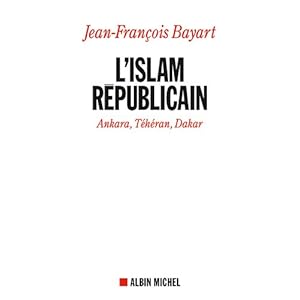Secular islam?
Out at lunch today, I was pleased I had taken a copy of Le Monde with me because I came across its review of "L'Islam Republicain: Ankara, Teheran, Dakar" by Jean-Francois Bayart. In one sense the book is a investigation of the relationship between religion and the state in three majority-Muslim countries.In another, it's a polemic, sparked off by the discussion on a burka ban, with a prevailing intellectual atmosphere in France that asserts a fundamental incompatibility between Islam and Republican values, such as the equality of women, and according to which "Republican Islam" is an oxymoron. Bayart starts his book by pointing out that the French Republic was not always noted for its commitment to equality - only with the 4th Republic in 1946 were women given the right to vote for example. He then goes on to analyse Islam in Turkey, Senegal and Iran, noting that the relationship between Islam and the state in all three cases - including in the Islamic Republic of Iran is far more complicated than claims that Islam and the state are inevitable intertwined and mixed up together. In his final chapter, he returns again to France, asserting that the republic has transformed its pragmatic sense of secularity into a new state religion, in which the armed wing is the continued recourse to the law, laws ever more prohibitive and therefore more repressive. It's not a short book - 450 pages - so I will have plenty to read on the 'plane to the United States.
Which 'operating system' do we need for the ecumenical movement?
The opening today of the European Christian Internet Conference in Sigtuna, Sweden, seems like the right time to pose the question of what "operating system" is needed for the ecumenical movement.
It might seem superfluous on a blog called 'Open Source Ecumenism' for such a question even to be posed: surely the answer is clear: the Mac/PC dichotomy is to be transcended through a common appeal to Linux, an open source operating system based on a common core to which people in different contexts can contribute or customize for their local situation. Yet, as John Gibaut, the WCC's director of Faith and Order, pointed out in a recent contribution to a meeting of Churches Together in Britain and Ireland, churches currently function with a range of operating systems when it comes to how they understand themselves as churches:
But are these issues simply questions about how the church relates to information technology? Maybe they also raise issues about the future "operating system" for the nature and mission of the church itself.
It might seem superfluous on a blog called 'Open Source Ecumenism' for such a question even to be posed: surely the answer is clear: the Mac/PC dichotomy is to be transcended through a common appeal to Linux, an open source operating system based on a common core to which people in different contexts can contribute or customize for their local situation. Yet, as John Gibaut, the WCC's director of Faith and Order, pointed out in a recent contribution to a meeting of Churches Together in Britain and Ireland, churches currently function with a range of operating systems when it comes to how they understand themselves as churches:
To use an imperfect analogy from the world of information technology, ecclesiology is like a church’s operating system. If we are using incompatible operating systems, it will not be possible to share texts, programs, or even to communicate with one another. “Ecclesiology” is such a specialized term, that I tend not to use it outside of an academic or Faith and Order context, because too many people, even those engaged in the ecumenical movement, are frightened off by the very word! And yet, like an operating system, which is as equally frightening to some of us, it is requisite if we are serious about the visible unity of the Church in one faith and in one eucharistic fellowship.The Christian Internet conference has on its agenda a range of issues. These include, "Hyperlinks subvert hierarchies: Institutional changes needed to communicate in social networks", "Do-it-Yourself or join existing platforms?", "The Voice of the People versus the Voice of an Institution".
But are these issues simply questions about how the church relates to information technology? Maybe they also raise issues about the future "operating system" for the nature and mission of the church itself.
Labels:
ecclesiology,
information technology,
open source
'Losing a voice' - remembering Marlin VanElderen
 Today marks the 10th anniversary of the unexpected, untimely and tragic death at the age of 54 of Marlin VanElderen, officially the executive editor of World Council of Churches publications, but in reality the force tranquille of the WCC, sought out for his careful advice and his ecumenical memory, the chief drafter of the WCC's Common Understanding and Vision document, and known for his passion - albeit in a rather understated, Reformed, sort of way - for communicating not only the WCC, but the ecumenical movement.
Today marks the 10th anniversary of the unexpected, untimely and tragic death at the age of 54 of Marlin VanElderen, officially the executive editor of World Council of Churches publications, but in reality the force tranquille of the WCC, sought out for his careful advice and his ecumenical memory, the chief drafter of the WCC's Common Understanding and Vision document, and known for his passion - albeit in a rather understated, Reformed, sort of way - for communicating not only the WCC, but the ecumenical movement.It was Whit Monday - Pentecost was late in 2000 - and I was spending the day off by sitting under a glorious sun on the terrace of the WCC restaurant correcting proofs for the ENI Bulletin. I smiled and waved to Jan Kok, head of publications, as he walked through the garden to the door at the back of the building. Jan, the former WCC communications director, was already living with the cancer that would lead to his own early death at the beginning of 2002. He walked over to where I was sitting; he could get only two words out. "Marlin's dead." It seemed like an age before I took in that Jan was saying that his colleague and best friend at the WCC had died.
Subscribe to:
Comments (Atom)




